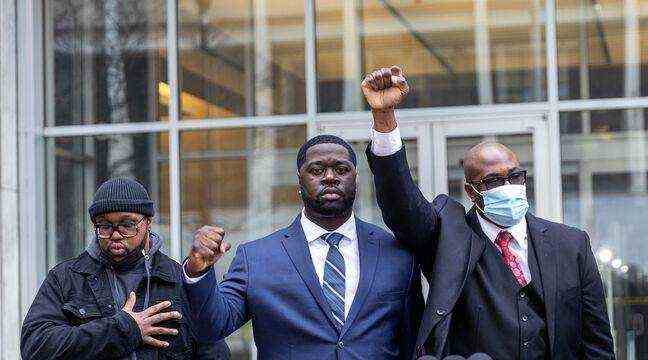For the first time, he is taking on some responsibility. White policeman Derek Chauvin, convicted of the murder of George Floyd, pleaded guilty on Wednesday to violating the constitutional rights of the black forty-something, admitting for the first time some responsibility in this drama that has shaken America and the world.
In an orange inmate jumpsuit, the 45-year-old former agent appeared briefly before a federal judge in St. Paul, in the northern United States, to formalize a plea-guilty agreement described as “historic” by the family. by George Floyd. He did not speak, except to acquiesce to the magistrate’s questions.
On May 25, 2020, this long-career Minneapolis police officer knelt on the African-American’s neck for nearly ten minutes, indifferent to the interventions of distraught passers-by and the groans of George Floyd.
The scene, filmed and uploaded, sparked outrage and sparked massive protests against racism and police violence across the United States and beyond.
In a well-attended lawsuit in Minnesota last spring, his lawyer argued that George Floyd had died of an overdose, combined with health problems, and assured that Derek Chauvin had made justified use of strength. He failed to convince jurors and the former policeman was convicted of murder and sentenced to 22 and a half years in prison. He appealed against this verdict.
Six more years in prison?
With good behavior, in Minnesota, an inmate can be granted parole after serving two-thirds of his sentence. This means Derek Chauvin could be released from prison after 15 years behind bars. But federal prosecutors have called for 25 years of detention to be served concurrently with the sentence handed down in state courts. If the judge imposed such a sentence, Derek Chauvin would have to serve at least 85%, or 21 years and three months. His federal conviction could therefore add a little more than six years of detention.
The impact of this turnaround on the case of his three co-defendants remains uncertain at this stage. These “double” prosecutions are authorized in the United States but relatively rare, and reflect the importance of this file which reopened a heated debate on the racist past of the United States.
“As our country continues to grapple with the demons of the past and present, the historic days give us hope. And today is one of those days, ”their lawyer Ben Crump said in a statement. “It is a victory for the interests of justice, but we will never forget its cost,” he added. “I am happy that more and more people are ready to discuss what is happening in America”, but “I cry all the time”, added Philonese Floyd, her brother, at the exit of the court: “we do not will never give us back George ”.

